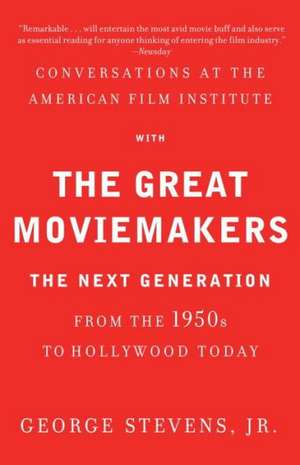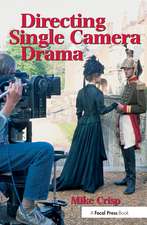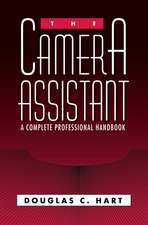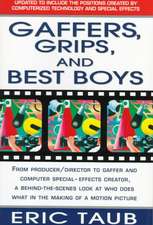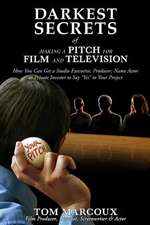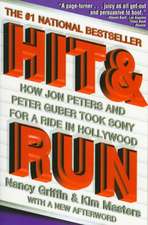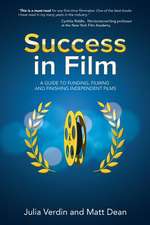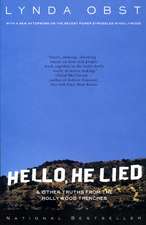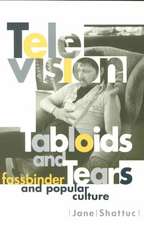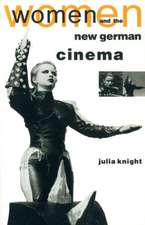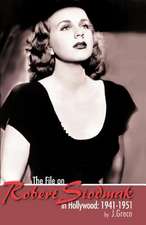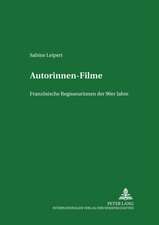Conversations at the American Film Institute with the Great Moviemakers: The Next Generation from the 1950s to Hollywood Today
Autor George Jr Stevensen Limba Engleză Paperback – 27 ian 2014
Those represented here—directors, producers, writers, actors, cameramen, composers, editors—are men and women working in pictures, beginning in 1950, when the studio system was collapsing and people could no longer depend on, or were bound by, the structure of studio life to make movies.
Here also are those who began to work long after the studio days were over—Robert Altman, David Lynch, Steven Spielberg, among them—who talk about how they came to make movies on their own. Some—like Peter Bogdanovich, Nora Ephron, Sydney Pollack, François Truffaut—talk about how they were influenced by the iconic pictures of the great pioneer filmmakers. Others talk about how they set out to forge their own paths—John Sayles, Roger Corman, George Lucas, et al.
In this series of conversations held at the American Film Institute, all aspects of their work are discussed. Here is Arthur Penn, who began in the early 1950s in New York with live TV, directing people like Kim Stanley and such live shows as Playhouse 90, and on Broadway, directing Two for the Seesaw and The Miracle Worker, before going on to Hollywood and directing Mickey One and Bonnie and Clyde, among other pictures, talking about working within the system. (“When we finished Bonnie and Clyde,” says Penn, “the film was characterized rather elegantly by one of the leading Warner executives as a 'piece of shit' . . . It wasn’t until the picture had an identity and a life of its own that the studio acknowledged it was a legitimate child of the Warner Bros. operation.”)
Here in conversation is Sidney Poitier, who grew up on an island without paved roads, stores, or telephones, and who was later taught English without a Caribbean accent by a Jewish waiter, talking about working as a janitor at the American Negro Theater in exchange for acting lessons and about Hollywood: It “never really had much of a conscience . . . This town never was infected by that kind of goodness.”
Here, too, is Meryl Streep, America’s premier actress, who began her career in Julia in 1977, and thirty odd years later, at sixty, was staring in The Iron Lady, defying all the rules about “term limits” and a filmmaking climate tyrannized by the male adolescent demographic . . . Streep on making her first picture, and how Jane Fonda took her under her wing (“That little line on the floor,” Fonda warned Streep, “don’t look at it, that’s where your toes are supposed to be. And that’s how you’ll be in the movie. If they’re not there, you won’t be in the movie”). Streep on the characters she chooses to play: “I like to defend characters that would otherwise be misconstrued or misunderstood.”
The Next Generation is a fascinating revelation of the art of making pictures.
Preț: 178.28 lei
Nou
Puncte Express: 267
Preț estimativ în valută:
34.12€ • 37.08$ • 28.68£
34.12€ • 37.08$ • 28.68£
Carte disponibilă
Livrare economică 31 martie-14 aprilie
Preluare comenzi: 021 569.72.76
Specificații
ISBN-13: 9780307474988
ISBN-10: 0307474984
Pagini: 737
Ilustrații: 103 PHOTOGRAPHS
Dimensiuni: 131 x 205 x 39 mm
Greutate: 0.69 kg
Editura: VINTAGE BOOKS
ISBN-10: 0307474984
Pagini: 737
Ilustrații: 103 PHOTOGRAPHS
Dimensiuni: 131 x 205 x 39 mm
Greutate: 0.69 kg
Editura: VINTAGE BOOKS
Recenzii
“Remarkable . . . simply indispensable for anyone who has even the remotest interest in film . . . an incomparably rich collection [of] candid, knowledgeable, and thoughtful conversations.”
—Choice Magazine
“Cuts across the spectrum of genres and artistic attitudes . . . a rare treat [and] an eclectic one . . . a treasure-trove to flip through and savor.”
—Betsy Sharkey, Los Angeles Times film critic
“Magnificent . . . Conveys a wonderful sense of the continuity of an industry and an institution . . . A collection that is compendious, illuminating, and utterly indispensible.”
—Director’s Guild of America Quarterly
“Wide-ranging and informative . . . Sure to be a stimulating, valuable, and much-used reference source for film addicts.”
—Library Journal
"Illuminating . . . informative and nostalgic . . . a montage of delights for all who like sitting in the dark, popcorn in one hand, a lover's in the other, transfixed."
—Cleveland Plain Dealer
“Truly indispensable to anyone who cares about the art of film.”
—Buffalo News
“Fascinating and valuable. To a film junkie, it doesn’t get much better than this.”
—Portland Book Review
“A feast for film junkies . . . a textbook made of cotton candy, an intellectual treat.”
—The Big Story (Associated Press)
“Remarkable . . . will entertain the most avid movie buff and also serve as essential reading for anyone thinking of entering the film industry.”
—Newsday
“Brings together, for the first time, thirty seminars with directors, producers, writers, actors, cinematographers, composers, and film editors . . . all of them talking honestly, seriously, openly.”
—Turner Classic Movies
—Choice Magazine
“Cuts across the spectrum of genres and artistic attitudes . . . a rare treat [and] an eclectic one . . . a treasure-trove to flip through and savor.”
—Betsy Sharkey, Los Angeles Times film critic
“Magnificent . . . Conveys a wonderful sense of the continuity of an industry and an institution . . . A collection that is compendious, illuminating, and utterly indispensible.”
—Director’s Guild of America Quarterly
“Wide-ranging and informative . . . Sure to be a stimulating, valuable, and much-used reference source for film addicts.”
—Library Journal
"Illuminating . . . informative and nostalgic . . . a montage of delights for all who like sitting in the dark, popcorn in one hand, a lover's in the other, transfixed."
—Cleveland Plain Dealer
“Truly indispensable to anyone who cares about the art of film.”
—Buffalo News
“Fascinating and valuable. To a film junkie, it doesn’t get much better than this.”
—Portland Book Review
“A feast for film junkies . . . a textbook made of cotton candy, an intellectual treat.”
—The Big Story (Associated Press)
“Remarkable . . . will entertain the most avid movie buff and also serve as essential reading for anyone thinking of entering the film industry.”
—Newsday
“Brings together, for the first time, thirty seminars with directors, producers, writers, actors, cinematographers, composers, and film editors . . . all of them talking honestly, seriously, openly.”
—Turner Classic Movies
Notă biografică
GEORGE STEVENS, JR., is a writer, director, producer, and founder of the American Film Institute. He is the author of the play Thurgood, which ran on Broadway and was filmed for HBO. He has received fifteen Emmys, two Peabody Awards, the Humanitas Prize, and seven Writers Guild Awards for his television productions, including the annual Kennedy Center Honors, Separate but Equal, The Murder of Mary Phagan, and We Are One: The Obama Inaugural Celebration at the Lincoln Memorial. His production The Thin Red Line was nominated for seven Academy Awards, including Best Picture. In 2009 President Obama named him co-chairman of the President’s Committee on the Arts and Humanities. Stevens started out working with his father, George Stevens, on Shane, Giant, and The Diary of Anne Frank and in 1962 was named head of the United States Information Agency’s motion picture division by Edward R. Murrow. He lives in Washington, D.C.
